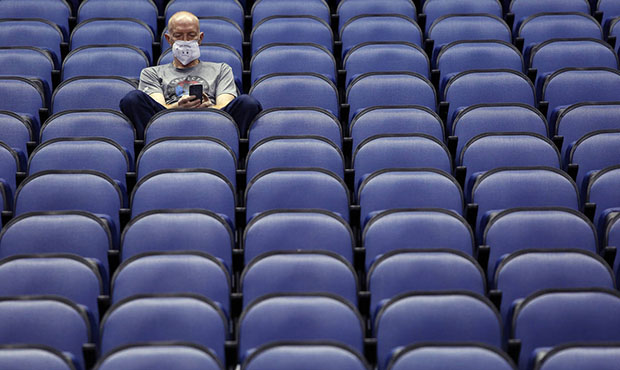All major American sports have been adjusting on the fly to the global pandemic our world faces. Adam Silver, Commissioner of the National Basketball Association (NBA), was the first to take significant action, suspending the NBA season on March 11th. His swift decision came on the heels of the postponement of an individual game after a Utah Jazz player returned a positive Coronavirus test. Silver’s decision has proven to be timely and invaluable as a handful of additional NBA players have since announced positive test results, even after the league suspended its season. The National Football League (NFL), albeit in a more manageable position with no gameplay, has had no shortage of decision making and adaptation.
Now lost in the discussion, the NFL’s Collective Bargaining Agreement is hot off the press, narrowly ratified by 60 votes on March 14th. The NFL Players Association’s (NFLPA) membership voted to pass the deal by a slim margin, with 1,019 players voting in favor and 959 voting against the deal. As a result, the NFL will have labor peace through at least the 2030 season. It is interesting to consider whether the vote would have turned out differently if the Coronavirus had been at the forefront of players’ minds earlier this month.
There is little precedent regarding what would/should happen to players’ salaries if the stoppage were to continue into the scheduled season. It would likely center on a Force Majeure analysis and have been a vogue topic of negotiation between the NFLPA and owners. According to the National Law Review, a Force Majeure Clause is a contract provision present in most commercial contracts that excuses a party’s performance of its obligations under the contract when certain circumstances arise beyond the party’s control making performance inadvisable, commercially impracticable, illegal, or impossible. Force Majeure Clauses provide a list of extreme events (generally called force majeure events) that, if they occur, can excuse a party’s performance under the contract. Force Majeure Clauses can vary greatly in language and length; however, many include events like epidemics or pandemics, along with war, terrorist attacks, “acts of God,” famine, strikes, and fire in the list of events excusing overall performance or delay in performance.
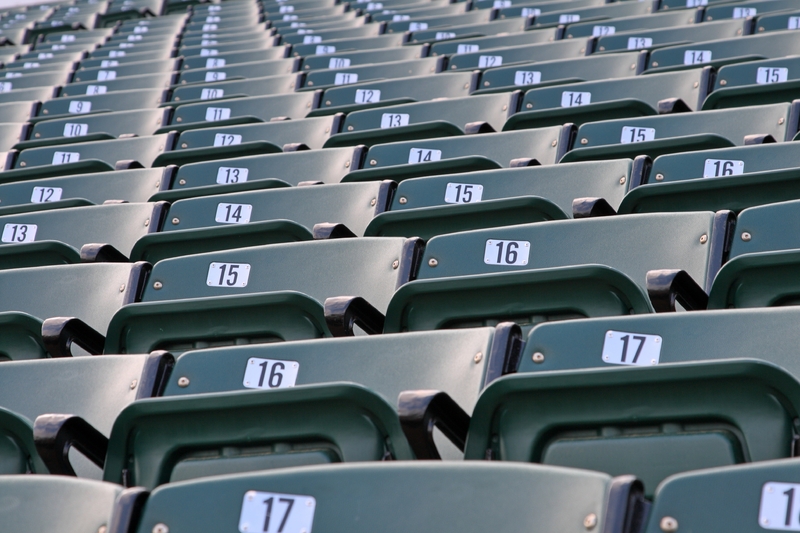
NFL Commissioner Roger Goodell hasn’t yet needed to address this matter but has made numerous other decisions, most notably electing not to postpone the NFL draft. The draft, originally scheduled to be held from April 23rd to 25th in new league territory Las Vegas, will keep its date but shed its venue. Goodell announced in a March 26th memo to league executives and key staff that the draft will not be postponed. He reasoned: “Everyone recognizes that public health conditions are highly uncertain and there is no assurance that we can select a different date and be confident that conditions will be significantly more favorable than they are today. I also believe that the draft can serve a very positive purpose for our clubs, our fans, and the country at large.” Fans will still be able to follow the draft day excitement on TV, and the NFL is exploring innovative options for how the process will be conducted. The LA Times reported that, while the NFL is not commenting publicly about what’s in the logistical works, two individuals with knowledge of the discussions told them that the current plans call for some type of studio setting with cut-ins from the headquarters of the teams making the selection at a given time. On April 6th, Goodell sent an additional memo to the league confirming that the draft will be conducted virtually from the homes of GM’s and coaches.
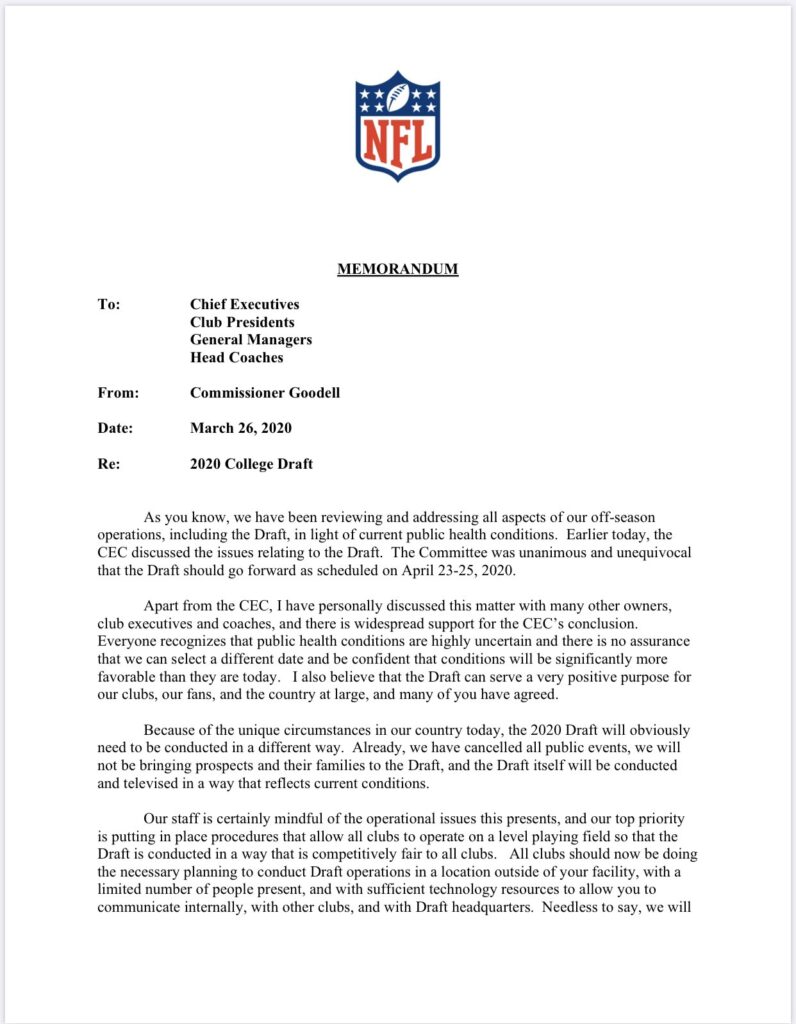
While fans are celebrating the vitality of what will likely be the first live sports event in over a month, two groups are experiencing adverse impacts from failure to postpone the draft: scouting departments and draft prospects. According to Adam Schefter, general managers are concerned that, in this current environment, with offseason activities canceled and some teams’ facilities closed, there won’t be enough time for player physicals, gathering psychological testing, getting further verified information about the players and some teams having to conduct the draft from home. League sources have said it would be a competitive disadvantage to have some teams in their training facilities during the draft while teams in California, New Jersey and other hard-hit areas would be in lockdown and unable to be in their teams’ buildings. San Francisco 49ers general manager John Lynch recently tweeted a video of his scouting set up, alone in a room in his house. However, through Zoom meetings and TV film review, his ultimate goal is averred: “no excuses, no explanations.” Saints General Manager, Mickey Loomis, said: “I’d be personally in favor of delaying the draft, so that we can get some of the work done that our scouts and our personnel people ordinarily do.” “This is not a fantasy draft that you conduct out there with just a list of things on a piece of paper. There’s a lot of work that goes into it to prepare, and there’s a lot of work that is done during the draft. Listen, it’ll be very, very difficult to conduct that and do it in a way that you’re doing justice to the process.” Even with concerns expressed around the league, Goodell made the decision to keep the draft date intact. To solidify and enforce his ruling, he included in his memo, “public discussion of issues relating to the Draft serves no useful purpose and is grounds for disciplinary action.”
The second group adversely affected by Goodell’s decision is the prospects entering the draft, especially fringe prospects who historically use this time to meet with as many scouts as possible in an effort to spike their chances of getting drafted. “The No. 1 group of people it’s screwing is the non-combine invitees,” agent Ron Slavin told Yahoo Sports. “I was talking to a general manager today who said they [usually] get a group of about 20 off-the-chart testers from pro days who get on their board for the sixth, seventh round. It just isn’t going to happen this year.” Former NFL tight end Garret Hudson expressed such concerns.
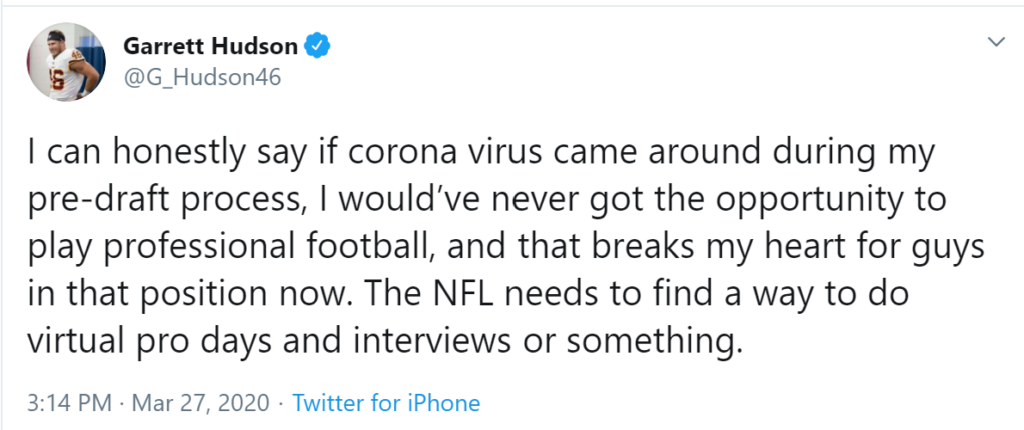
Some agents, like Nathan Shackelford of Higher Calling Sports, were able to conduct private pro days and player trainings before significant changes from the virus came into effect. It’s so important to get exposure for prospects at this time and this was a creative way to do so, bringing in former NFL scouts.
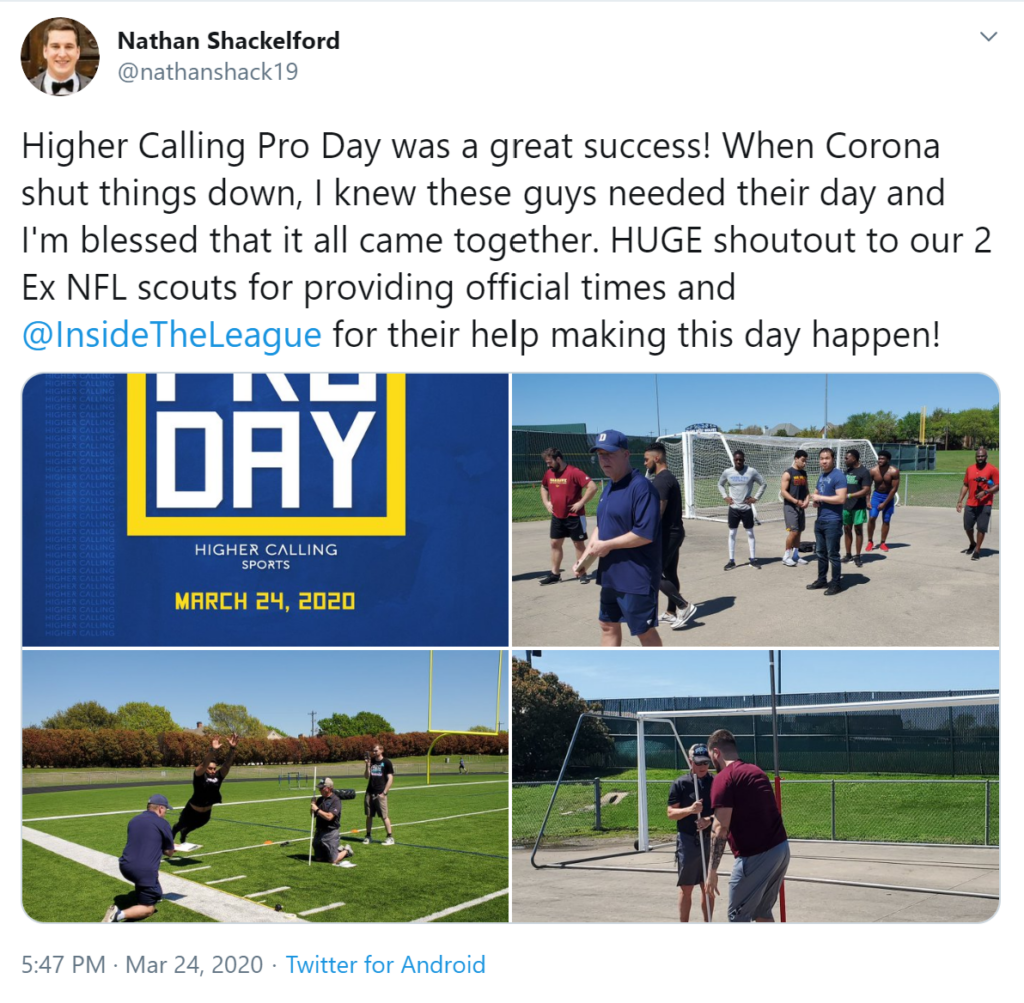
In an effort to level both the nationwide case curve and league-wide playing field expressed by Loomis, the Commissioner sent a memo to teams announcing that all club facilities are now closed. “During this time, clubs are still free to conduct all normal business operations, including signing players, evaluating draft-eligible prospects, selling tickets, and other activities to prepare for the 2020 season,” the memo said. Current players have had their offseason training programs stirred and are conducting workouts at home rather than at team training facilities and usual routine locations. One such player is recently signed Jaguars linebacker Joe Schobert; he has demonstrated John Lynch’s no excuse mentality. His Twitter handle, “TheSchoGoesOn53” even applies to quarantine at his in-laws.
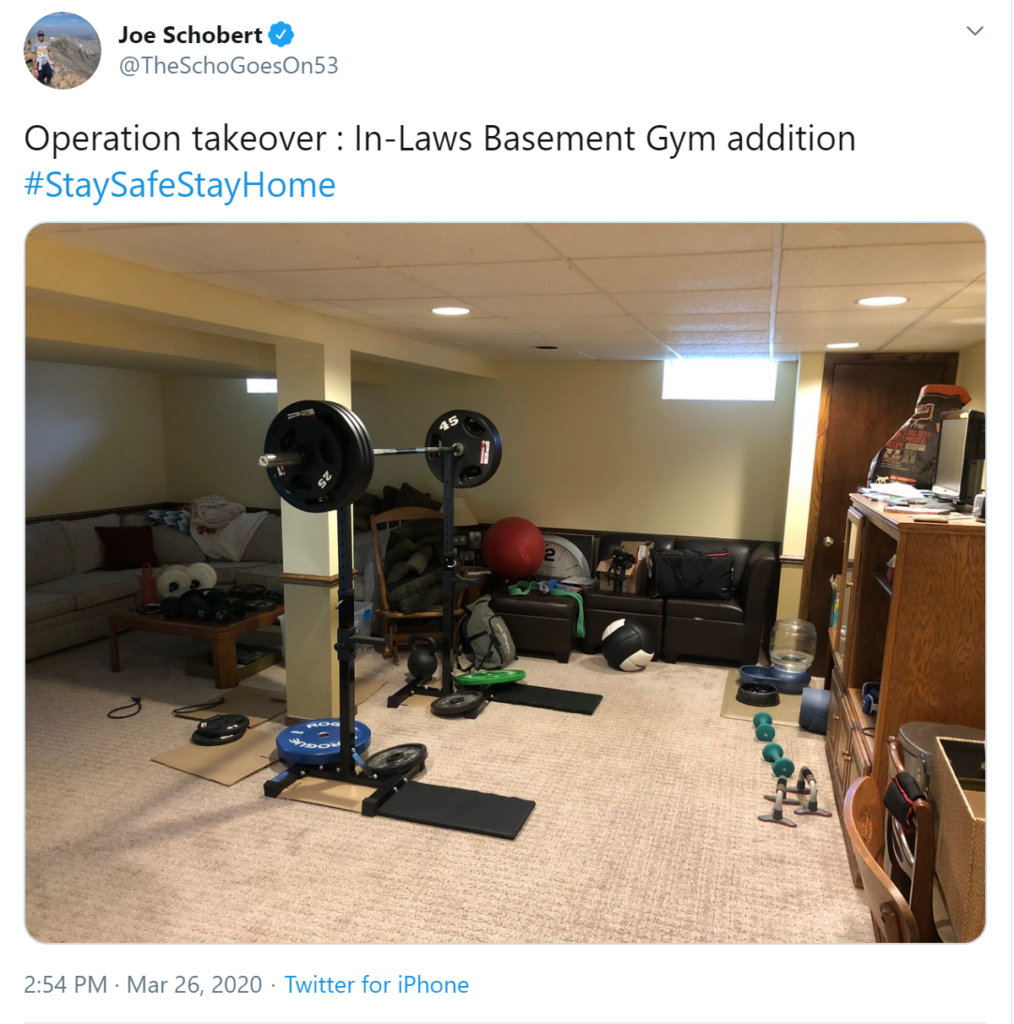
Even with negative impacts of the virus felt around the league and much of the world right now, many have come through to show how strong the NFL community is. Saints quarterback Drew Brees further solidified his immortal legacy in Louisiana, announcing that he and his wife Brittany will commit $5 million to the Coronavirus relief effort in the state. Recently acquired Cardinals receiver Deandre Hopkins also made a significant donation, his to the Arizona relief effort.
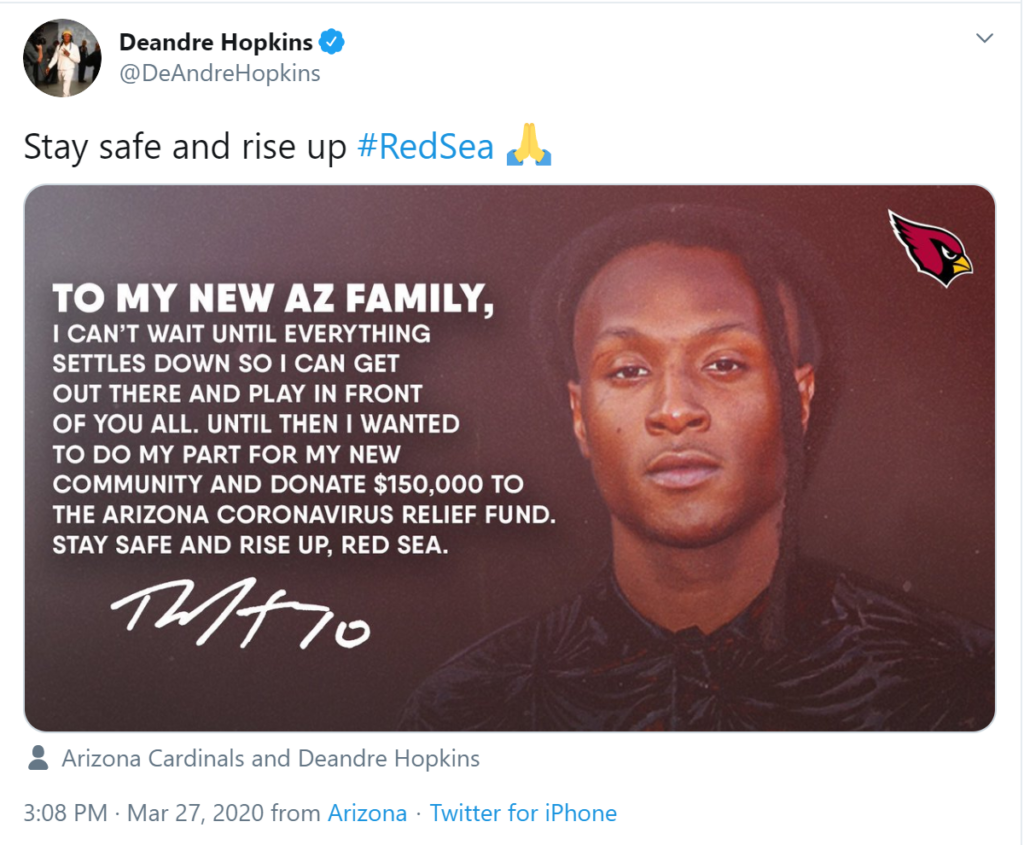
Hopkins’ former quarterback, Deshaun Watson, donated to the Restaurant Workers Relief Program, which provides meals to restaurant employees who have lost their jobs or seen their pay reduced. According to a press release, the 24-year-old Watson’s donation “will provide hundreds of meals for displaced workers over the next one-two weeks.”
The National Football League announced that, in collaboration with the NFLPA, clubs, owners, and players, more than $35 million has been donated to date, including $3.4 million from the NFL Foundation as part of the COVID-19 relief efforts. The 10 organizations receiving donations are: American Red Cross, Bob Woodruff Foundation, Boys & Girls Clubs of America, CDC Foundation, GENYOUth Foundation, Meals on Wheels America, Salvation Army, Team Rubicon, United Way and Wounded Warrior Project.
Former NFL player and Walter Payton Man of the Year Award Finalist Benjamin Watson published a tremendous article giving parents advice on how to discuss and explain the Coronavirus to their children. Another former NFL player, Myron Rolle, has transitioned from the line of scrimmage to the front lines of an emergency room. In 2017, Rolle was accepted into the Harvard Medical School neurosurgery program at Massachusetts General Hospital. Now, he is treating Covid-19 patients.
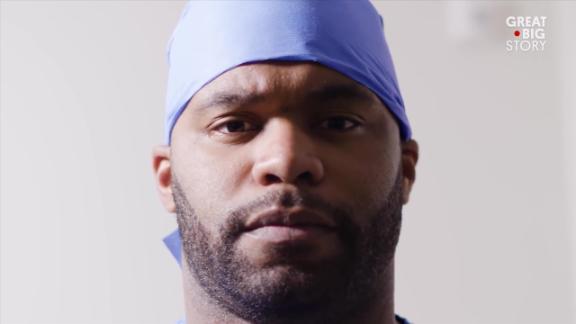
The NFL is going to experience shortcomings, discrepancies, and anguish from the Coronavirus. With that being said, league members must practice perspective in thinking about life outside of football and the disparate effects on those less fortunate. As demonstrated by the Watsons, Myron Rolle, and so many others in football, it is being done gracefully. There are more touchdowns to be scored tomorrow.
